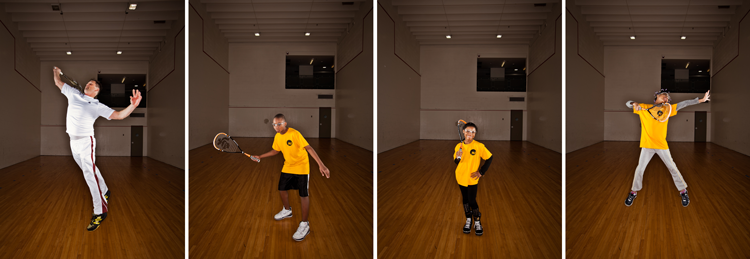Last year, Derek Aguirre walked out of Harvard University with a freshly printed master’s degree in hand. Full of ambition and eager to make a difference in the world, he began his chosen career — behind the wheel of a newly refurbished school bus.
Today, Aguirre uses his chauffeur license to ferry students between school and the Northwest Activities Center in Detroit, to such events as the Motor City Open at the Birmingham Athletic Club, and to visit local college campuses.
During his undergrad days, while participating in U-M’s Detroit Partnership program, he became “fascinated and inspired” by Detroit. “It set a vision for me, for what I might like my career to look like,” he says. Fast-forward eight years. Aguirre’s Racquet Up Detroit serves a group of 40 fifth-graders from Schulze Academy and MacDowell Elementary in Detroit.

Why this particular racquet sport? “There’s something about squash that catches kids’ attention,” he says, adding that it’s engaging from the first minute you hit the ball. “It’s also an individual sport, which helps kids measure their own progress,” he says. “You can always get a competitive match, no matter what level you play.”
Although somewhat esoteric, squash is enjoying a resurgence. Forbes magazine named it the healthiest sport to play, and the preferred game of Wall Street. The National Collegiate Athletic Association (NCAA) says the fast-growing sport crosses socio-economic strata and offers opportunities for female athletes. (Twenty girls are enrolled in Racquet Up Detroit.)
Expanding opportunities is what Racquet Up is all about. In Boston, he says, among students who started and stayed with the program through high school, nearly 100 percent graduated and more than 90 percent went on to attend college. He hopes for similar success with his students here.
 Racquet Up’s after-school sessions include academics, the court, and field trips. Study time includes a literacy program that was developed with a Michigan State University professor and some of her doctoral students, Aguirre says.
Racquet Up’s after-school sessions include academics, the court, and field trips. Study time includes a literacy program that was developed with a Michigan State University professor and some of her doctoral students, Aguirre says.
Students also receive one-on-one attention with tutors on homework and various academic subjects. Racquet Up currently has two part-time employees and about 40 volunteers.
One might think that getting your own racquet personalized with your name might be the highlight. But children also give the tutoring high marks. “My favorite is the academics, says fifth-grader Starnisha Ramsey. She mentions poetry and her affection for Langston Hughes.
As 11-year-old Anthony Holmes puts it: “It’s just not playing squash, [the program] helps you with your future. In math, I had a C; now I have a B, and I’m going for an A.”
 On the court, practice is a combination of fitness, drills, and plays. Side-by-side instruction allows for the occasional dispensing of life tips. Aguirre pauses at one point to instruct his students on their grip — as in the importance of a firm handshake.
On the court, practice is a combination of fitness, drills, and plays. Side-by-side instruction allows for the occasional dispensing of life tips. Aguirre pauses at one point to instruct his students on their grip — as in the importance of a firm handshake.
In Detroit, tryouts were held last November and included a week of squash and team-building activities. The program was opened to fifth-graders, because, Aguirre says, that’s “about the right age for students to take on real responsibilities.”
Making the cut had little to do with how well the hopefuls hit the ball. Rather, “it had everything to do with their attitude, and their willingness to take risk, and try new things,” he says. Once children are selected, Aguirre meets individually with their families to lay out the program and explain that their child will be part of it until high-school graduation — if circumstances allow.
 “I really didn’t know what it was until Derek had come over to the house and explained it to me,” says Shannon Johnson, a newly minted “squash mom.”
“I really didn’t know what it was until Derek had come over to the house and explained it to me,” says Shannon Johnson, a newly minted “squash mom.”
“I was excited; I think it’s great for kids to have something to do outside of school, instead of running the streets and possibly getting into trouble.”
Across town, in a humble building on a worn stretch of Michigan Avenue, another unlikely sport is keeping kids grounded. In space shared with an art studio, the En Garde fencing school has children crossing swords in a manner that teaches discipline, self-assurance, and responsibility.
“Emotional control is incredibly vital to a professional fencer,” says En Garde founder Bobby Smith, who recently added Sword Dreams, a non-profit element to his program. “You can’t become flustered; you have to maintain control and composure. When faced with adversity, those same principles apply.”
Among the young pupils learning to finesse an epee is 13-year-old Billy Snyder, who says, “It’s a great workout, and it’s a fun sport to do. I’d like to use fencing to get through college.”
 To donate to Racquet Up or learn more about the programs: racquetup.org, engardedetroit.com.
To donate to Racquet Up or learn more about the programs: racquetup.org, engardedetroit.com.
If you enjoy the monthly content in Hour Detroit, “Like” us on Facebook and/or follow us on Twitter for more frequent updates.
|
|
|









